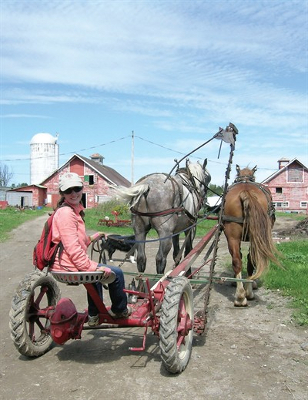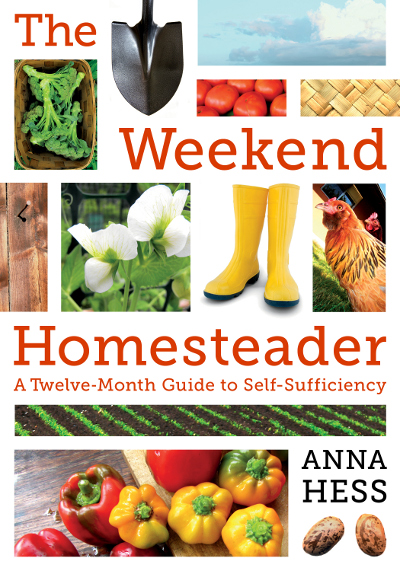
Choosing appropriate farm technology
 When we first meet Mark
Kimball in The Dirty Life, he forces Kristin to live
in a fully wired house without turning on the electricity (to her
chagrin). A year later, they have a freezer and fridge.
Similarly, they plan their farm to be cultivated with horse power, but
do have a backup tractor that sees some use.
When we first meet Mark
Kimball in The Dirty Life, he forces Kristin to live
in a fully wired house without turning on the electricity (to her
chagrin). A year later, they have a freezer and fridge.
Similarly, they plan their farm to be cultivated with horse power, but
do have a backup tractor that sees some use.
Choosing your own level
of appropriate technology is an important but difficult task for most
homesteaders. Do you carry the water from the creek or pay the
startup costs and electricity bill to irrigate your crops? Do you
try each time-saving device you read about in Mother
Earth News, or do
you remember that energy is used and waste produced for every item you
buy?
On our own homestead,
Mark's a gadget guy and I'm a skinflint, so we often have to negotiate
compromises. I'm curious to hear from other homesteaders --- how
do you decide what consists of appropriate technology? When you
were reading The
Dirty Life, did you end up dreaming of
a farm with draft horses, or did the runaway horse episode cure you of
that romantic notion in a heartbeat?
 Those of you new the book
club might want to check out previous discussions that covered learning
that real food is imperfect, pacing
yourself in the early years, and working
together without killing each other. Since we've come to the
end of The Dirty Life,
now would also be a good time to comment with anything that really
jumped out at you from the book that I haven't mentioned here.
We'll take a week off, then will jump into Radical
Homemakers on August 29.
Those of you new the book
club might want to check out previous discussions that covered learning
that real food is imperfect, pacing
yourself in the early years, and working
together without killing each other. Since we've come to the
end of The Dirty Life,
now would also be a good time to comment with anything that really
jumped out at you from the book that I haven't mentioned here.
We'll take a week off, then will jump into Radical
Homemakers on August 29.
The
Weekend Homesteader provides
tips for becoming more self-sufficient one weekend at a time.
Want more in-depth information? Browse through our books.
Or explore more posts by date or by subject.
About us: Anna Hess and Mark Hamilton spent over a decade living self-sufficiently in the mountains of Virginia before moving north to start over from scratch in the foothills of Ohio. They've experimented with permaculture, no-till gardening, trailersteading, home-based microbusinesses and much more, writing about their adventures in both blogs and books.
Want to be notified when new comments are posted on this page? Click on the RSS button after you add a comment to subscribe to the comment feed, or simply check the box beside "email replies to me" while writing your comment.

Most of our neighbors are amish, so I get to see how well draft horses work for farming, regularly. Around here though, they share the horses. The teams move from farm to farm.
I'd trade our tractors in for horses in a heart beat, but my husband simply rolls his eyes. (Our manure spreader is an old horse pulled one, converted to hook to the tractor) Since farming is not a full time venture for us, and since we are often too lazy to saddle the horses we have just to ride as often as we should, it's probably not practical.
We have 4 teens helping with watering now, but just this year we decided, before they all leave the house, that next years project is to run water lines to all the pastures.
The toilet her husband set up in the beginning of the book would be WAY too much for me.. I do insist on working plumbing. I guess I am a gadget girl - I've been known to use my smart phone as a level when building the chicken fence (yep, there's an app for that!) and to look up how to repair the baler in the middle of the hay field. I've also been known to update my facebook status while on horseback.
I was curious about where she got all of her books and information without internet, or did they have internet? It's a wonderful thing, to be able to google every symptom our livestock exhibits, and every project we are working on.
It is interesting to read that you'd need 16 horses to replace one tractor. Because it is said of a pair of shire horses (which are quite big and powerful animals):
Anna, I think you'd enjoy the book about some archeologists re-living the life on a victorian farm, which of course predates a lot of modern farming equipment. Although I haven't read the book, I saw the original series on the BBC (which is quite good at making quality programs), and I would recommend it. Quite interesting.
Roland -- Thanks for the recommendation! That book is right up my alley! Those historical recreations are the only reality TV I'm ever tempted by, but when I watch them, I tend to feel like it's too TV-like (focus on silly dramas) with too little interesting history. A book sounds like the perfect solution!
By the way, I suspect part of the issue of horse vs. tractor is that we tend to get tractors that do way more than we need them to. If mechanical horsepower is relatively cheap, why not make your tractor equivalent to 16 horses for the one time you need to do something really hard?
The technology question is interesting. I could not pry our tractor out of DH's cold dead hands even if I wanted to, and I don't. It makes quick work out of a million tasks. And I'm an engineer, so I lean toward gadgets too (but much less than my coworkers, most of whom buy the latest iPads etc.) I have talked him into no-till gardening though, despite how "pretty" the soil looks once it's been done over.
At the same time, we're both pretty frugal. So when I do buy a gadget/tool, it's usually because I'm frustrated with how much time I'm spending doing something. I spend a long time debating whether it's worth the money, how much time it would save me, etc.
Bottom line, for us it's time vs. money. We're weekenders, and still working the day jobs, so the scales for us are tipped toward having alot of tools.
As for other parts of the book - I got a good laugh when they were selecting their land, and walked around with a shovel checking out the dirt. I might not have bought our place if I'd done that and seen all the clay!
I have still not joined your book club as my library does not have said book. I may have to download it.
I do enjoy reading about it here. P.S. I like when you plug books here.
Mrs. Truckenmiller --- It does make a lot more sense to have draft horses if you can share them with your neighbors. Just like a tractor would be overkill on our homestead, a team of draft horses would be too.
I'm not sure about their internet connection --- I would suspect they don't have it, but could be wrong. I'm with you --- homesteading without the internet would be much harder.
De --- It's very true that for many weekend homesteaders, it makes more sense to spend money on gadgets instead of time on doing things the hard way because most folks like that have a lot more money than time. Unfortunately, that approach can also tend to consolidate them as lifetime weekend homesteaders. (Or maybe that's not unfortunate for some people --- that may be as deep as they want to delve into the lifestyle!)
I'm with you on the researching hard before buying a new gadget. The Ultimate Cheapskate recommends putting off your decision as long as possible on expensive items --- you might decide you don't want it.
I have to admit I didn't look at the soil here before buying either. I suspect that for a homesteader, it's better not to --- bad soil is par for the course, and you can improve a small kitchen garden nearly regardless of the issues. (Well, barring heavy metal contamination or something like that.) For a market gardener, though, soil quality would be essential.
Kathleen --- Glad to hear you're enjoying hearing about books even if The Dirty Life hasn't made it to your library yet. Hopefully Radical Homesteaders will be there!